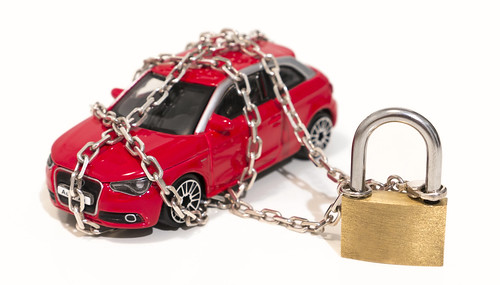Motorists who have received traffic violations or had at-fault accidents may be required to prove financial responsibility and maintain an SR-22 form through their car insurance company with the state. The SR-22 form may be required by either a judge in traffic court or by the state’s Department of Motor Vehicles.
Required to keep or reinstate a suspended driver’s license, an SR-22 is vital for maintaining a driver’s license and meeting state requirements for insurance. Letting insurance lapse or having further moving violations during the three-year SR-22 period can result being fined, fees, and loss of driving privileges.
Who Notifies Motorists of the SR-22 Requirement?
Depending on the circumstances, either the traffic court judge will provide details about the SR-22 requirement, or the state’s Department of Motor Vehicles will mail a letter with the details. In Illinois, the Illinois Secretary of State’s office manages the motor vehicle department.
Regardless of how motorists are informed of SR-22 requirements, the certificate needs to be filed for three years in Illinois to certify the driver has sufficient car insurance. Requirements may change if you move to Illinois from another state or if you move from Illinois to another state. It’s up to you to communicate SR-22 requirements to your insurer and make sure you comply.
Which Companies Provide SR-22 Certificates?

Not all insurers provide SR-22 certificates, so higher-risk drivers often have fewer options and higher car insurance rates. Insurers with experience handling higher-risk drivers will likely have more options to meet your insurance needs.
Several insurance companies specialize in higher-risk drivers, and many of the largest insurance companies offer SR-22 forms. The circumstances that led to the SR-22 requirement, as well as several other factors, will determine how much higher your insurance rates will be. You can add an SR-22 to an existing policy if the insurer agrees, but some insurers may cancel policies. It’s important to be upfront with insurers about SR-22 requirements and other circumstances, so you get the right policy without any surprises.
How Does an SR-22 Work in Illinois?
SR-22 forms in Illinois prove to the state you’re carrying sufficient insurance. Like SR-22 forms in many other states, your insurance company files them for a nominal fee, typically $15 to $25 in Illinois. SR stands for safety responsibility, and the certificate is required for three years in Illinois and can increase insurance rates by 15 to 40%.
Keeping an SR-22 certificate requires maintaining current insurance policies by consistently paying the monthly cost of your insurance and not receiving more tickets or having any further at-fault accidents. Canceled or lapsed policies can lead to driver’s license suspension, fines and fees, and vehicle registration suspension. Insurers are required to report any policy lapses.
SR-22 certificates will lead to higher insurance costs, but other factors like driving records, insurance history, credit, zip code of the driver, and the type of vehicle affect insurance rates. Higher liability coverage, comprehensive coverage, and lower deductibles improve the quality of the coverage but also increase the price. Balance insurance features with an affordable premium, keeping in mind that higher value vehicles and cars with loans should have comprehensive coverage in addition to liability coverage. SR-22 insurance can also include additional coverage, like uninsured/underinsured motorist coverage.
In addition to higher premiums, some drivers may need to pre-pay their policies, commonly six or 12 months at a time. Illinois regulations require that SR-22 insurance be renewed 45 days before the policy expires. If drivers don’t renew the policies within 15 days of expiration, insurance companies are required to report this to the state.
Illinois has three types of SR-22 certificates:
- Operator’s certificate: Covers the driver of any non-owned vehicles.
- Owner’s certificate: Covers the vehicles owned by the driver.
- Owners-operators certificate: Covers all owned and non-owned vehicles.
What Circumstances Commonly Lead to SR-22 Filing?
Many factors can lead to an SR-22 requirement in Illinois or another state. While the traffic court judge or the motor vehicle department will notify drivers of SR-22 requirements in Illinois, driving infractions in other states can lead to SR-22 requirements that may follow you to Illinois. Illinois residents who have a traffic violation in another state may be required to file an SR-22 with that state. People who move to Illinois may find out an SR-22 requirement is still required in their new state.
For those who don’t own a car but need to keep their driver’s license to drive borrowed or rented vehicles, non-owner policies are available. Non-owner policies may be required for keeping or reinstating driving privileges as well. Non-owner coverage protects others through the property and personal injury liability insurance but doesn’t cover the borrowed or rented vehicle or the driver’s medical bills.
SR-22 requirements stem from a variety of circumstances, including:
- No or insufficient coverage.
- No driver’s license or driving with a suspended license.
- Drinking and driving or operating under the influence.
- Tickets or at-fault accidents.
- Missing child support payments.
- A hardship license for getting to work.
What Happens When SR-22 Requirements Expire?
After three years of keeping a policy in force and not having severe moving violations or at-fault accidents, SR-22 requirements expire in Illinois. At this time, drivers need to notify their insurance company that the SR-22 requirement isn’t in force. This opens the door to lower insurance costs and more insurance options. Infractions or accidents during the three years may extend the SR-22 requirement.
Do All States Have SR-22 Requirements?
Many states require SR-22 certificates or similar proof of financial responsibility and insurance coverage, but some have no requirements. It’s up to drivers who move in or out of Illinois to make sure they follow insurance requirements. Drivers may have to follow insurance coverage requirements from their home state even if they move to a state with lower minimums.
Florida and Virginia have SR-22 forms and an FR-44 requirement for DUI/DWI convictions that require liability insurance that exceeds state minimums. SR-22 forms aren’t required in Delaware, Kentucky, Minnesota, New Mexico, New York, North Carolina, Oklahoma, and Pennsylvania. States that require an SR-22 may require it for two to five years.
Drivers needing an SR-22 form need to find an insurer to meet the state’s requirements and keep policies active while avoiding traffic infractions. While the number of insurers and policy options may be limited, American Auto Insurance specializes in serving all Illinois drivers regardless of SR-22 requirements or other unique needs. Get a free quote and get back on the road with a policy that fits your budget and provides instant proof of coverage.


